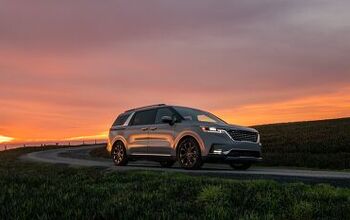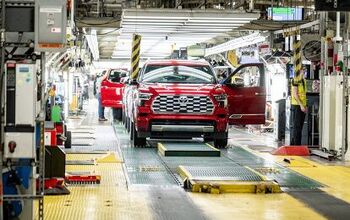Which Brands Fared Best in 2017's Consumer Reports' Reliability Survey?

Consumer advice is one way informed shoppers like to make a decision, and few buying choices are bigger than your next car. Every year, Consumer Reports surveys its subscribers to see how they’re getting on with their personal vehicles. While the metrics may have changed over the years, its annual reliability report is one people and automakers pay particularly close attention to.
However, this year, some automakers were paying closer attention than others. Tesla, irritated that CR was so hard on the Model X — while predicting the Model 3 would possess “average reliability” — fired back at the publication with a press release calling shenanigans. “Time and time again, our own data shows that Consumer Reports‘ automotive reporting is consistently inaccurate and misleading to consumers,” the automaker wrote in a release.
While Consumer Reports exists as a nonprofit organization providing consumer advice, Tesla has accused it of making the electric automotive brand a target to bolster attention. Whether or not that’s true is debatable, but it did use predictive reasoning to assess the Model 3’s probable reliability — rather than data collected from testing and customer surveys.
It would be easy to chalk this up to a mistake, but CR had little to go on. Since there are still so few Model 3s on the road, the magazine made its best guess on how the new EV would stack up based on how poorly the Model X had performed and how much better the Model S has gotten over time.
“Electric vehicles are inherently less complicated than gasoline or hybrid alternatives. The Model 3 is the least complicated Tesla yet, and should benefit from what Tesla has learned from the Model S,” said Jake Fisher, director of auto testing at Consumer Reports, in a statement.
In this instance, it may have been better for the organization to wait on Tesla to furnish society with more examples of its new sedan. But, as CR specified this was a predictive analysis, it’s difficult to fault them for any grotesque wrongdoing.
Of course, Tesla wasn’t the only brand who ended up on the business end of some unfavorable comments. General Motors took some abuse after the publication placed Chevrolet, Cadillac, and GMC in the bottom third of its reliability rankings. For Chevrolet, the Bolt is an all-star in terms of reliability but complaints about the Cruze and Volt helped drag it down the board.
GMC and Cadillac sit at the bottom of Consumer Reports’ brand rankings, however. The Acadia debuted with below-average reliability, while every model from Cadillac fared rather poorly. A lot of this comes down to in-car electronics and how customers interface with them.
In fact, unreliable and difficult to manage tech was one of the primary reasons the survey had so much movement on the board this year. Consumer Reports said new infotainment units and nine-speed or continuously variable transmissions were a fairly consistent sore spot for surveyed individuals. In fact, complaints related to all manner of in-car electronics doubled for first-year models in 2017.
“These new technologies can add features and improve fuel efficiency, but are more prone to have issues. More often than not, our data suggests it’s prudent for consumers to wait for the technology to mature,” Fisher said.
Some of automakers have addressed the issue head on. For example, Honda and Hyundai both changed some of their digital interfaces for the current model year. While this wasn’t enough to move Hyundai up the board, Honda did creep up a single place to spot number nine.
Further down the board FCA brands also made marked improvements. According to CR, Jeep has remedied some of the transmission problems that plagued its earlier models. Dodge’s Grand Caravan remains the only model in its fleet to garner a score better than “below average,” but its models received fewer complaints overall this year. It was enough to move both Jeep and Dodge up the board a few spaces. Ram also improved, but remains among the least-reliable brands currently in existence.
Chrysler performed much better. Making the biggest improvement of any manufacturer this year, it jumped up 10 places and slotted itself in the middle of the pack between Volkswagen and Chevrolet.
Meanwhile, at the top of the board, we find the usual suspects. Toyota is followed closely by Lexus as the two most reliable brands on the market, followed by Kia and Audi. BMW took fifth place, pursued closely by Subaru and Infiniti. Buick is next, having lost marks for the redesigned LaCrosse. Fortunately, the rest of its lineup continues to perform well in the reliability survey.
Glossing over the middle of the pack — which includes the likes of Nissan, Mazda, Porsche, Mercedes-Benz, Ford, and Volkswagen — we move to the bottom. Performing slightly worse than Tesla, Lincoln saw its score weighted down by the MKC and MKX and took 21st place overall. It is followed by Volvo and the previously mentioned Dodge, Ram, GMC, and Cadillac.
This year’s survey contacted roughly 400,000 subscribers to compile data on over 640,000 vehicles. Consumer Reports said the takeaway for 2017 is that updated and brand-new models are more likely than older ones to have an unreliable engine, quirky transmission, or high-tech features that fail outright. Its recommendation is to consider models that have proven themselves and have been around for a few years, rather than opting for the first installment of a new model.
“Car companies test their prototype vehicles, but mass production and a wide range of real-life driving scenarios multiply the number and nature of problems that can arise in a new model,” said Fisher.
In other words, the devil you know is often times better than the devil you don’t. Even a company earning subpar markings may have a proven platform in its lineup. But it’s difficult to uncover that diamond in the rough before it’s had time to prove itself on the streets.
[Image: Toyota]

A staunch consumer advocate tracking industry trends and regulation. Before joining TTAC, Matt spent a decade working for marketing and research firms based in NYC. Clients included several of the world’s largest automakers, global tire brands, and aftermarket part suppliers. Dissatisfied with the corporate world and resentful of having to wear suits everyday, he pivoted to writing about cars. Since then, that man has become an ardent supporter of the right-to-repair movement, been interviewed on the auto industry by national radio broadcasts, driven more rental cars than anyone ever should, participated in amateur rallying events, and received the requisite minimum training as sanctioned by the SCCA. Handy with a wrench, Matt grew up surrounded by Detroit auto workers and managed to get a pizza delivery job before he was legally eligible. He later found himself driving box trucks through Manhattan, guaranteeing future sympathy for actual truckers. He continues to conduct research pertaining to the automotive sector as an independent contractor and has since moved back to his native Michigan, closer to where the cars are born. A contrarian, Matt claims to prefer understeer — stating that front and all-wheel drive vehicles cater best to his driving style.
More by Matt Posky
Latest Car Reviews
Read moreLatest Product Reviews
Read moreRecent Comments
- Analoggrotto Does anyone seriously listen to this?
- Thomas Same here....but keep in mind that EVs are already much more efficient than ICE vehicles. They need to catch up in all the other areas you mentioned.
- Analoggrotto It's great to see TTAC kicking up the best for their #1 corporate sponsor. Keep up the good work guys.
- John66ny Title about self driving cars, linked podcast about headlight restoration. Some relationship?
- Jeff JMII--If I did not get my Maverick my next choice was a Santa Cruz. They are different but then they are both compact pickups the only real compact pickups on the market. I am glad to hear that the Santa Cruz will have knobs and buttons on it for 2025 it would be good if they offered a hybrid as well. When I looked at both trucks it was less about brand loyalty and more about price, size, and features. I have owned 2 gm made trucks in the past and liked both but gm does not make a true compact truck and neither does Ram, Toyota, or Nissan. The Maverick was the only Ford product that I wanted. If I wanted a larger truck I would have kept either my 99 S-10 extended cab with a 2.2 I-4 5 speed or my 08 Isuzu I-370 4 x 4 with the 3.7 I-5, tow package, heated leather seats, and other niceties and it road like a luxury vehicle. I believe the demand is there for other manufacturers to make compact pickups. The proposed hybrid Toyota Stout would be a great truck. Subaru has experience making small trucks and they could make a very competitive compact truck and Subaru has a great all wheel drive system. Chevy has a great compact pickup offered in South America called the Montana which gm could make in North America and offered in the US and Canada. Ram has a great little compact truck offered in South America as well. Compact trucks are a great vehicle for those who want an open bed for hauling but what a smaller more affordable efficient practical vehicle.


































Comments
Join the conversation
I hope Volvo’s low score is from their newer models as i’m about to pull the trigger on a 2016 XC70 (AWD 2.5). Yikes!
It is strange that Cadillac get the best reviews and awards among American cars and finishes last here. The CTS and ATS are North American car of the year winners.